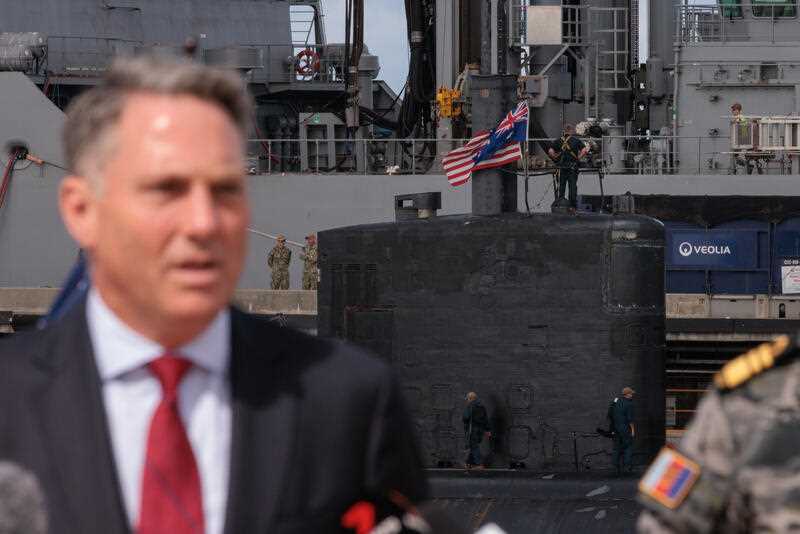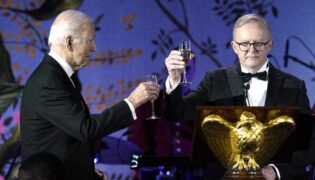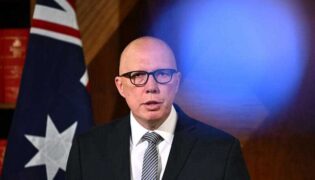
The Labor national conference has a deep historic legacy, having shaped some of our young nation’s most consequential policy decisions. Despite diligent efforts to quell the detractors and instil a sense of unity, the conference couldn’t avoid public rancour bubbling up over the half-a-trillion dollar target that is AUKUS: Australia’s largest military spend since the Second World War.
Signs of dissent had been developing in the weeks leading up to the conference. A movement called Labor Against War had sounded strong opposition to the Morrison-era military agreement, one which now bears a distinct Labor flavour. Branches across the country drafted letters condemning the tripartite agreement, the members clearly anxious about AUKUS and eager to challenge the government’s position.
As word hit party leadership, moves were made to obstruct the motion to debate AUKUS. Behind the scenes, senior AUKUS architects drafted thirty-two paragraph statements and held Zoom conferences with concerned party faithful, and on the day, with police in attendance, the Albanese government’s AUKUS shills barged their way through the motion, leaning into the exaggerated applause up front for courage while playing deaf to the electorally terrifying jeers and boos that rung out from the public gallery.
AUKUS looks to change the fundamental resting state of our nation. It involves nuclear industry we don't want, an appetite for war we don't have, and handing our sovereignty away to those we don't trust
AUKUS is against the fundamentals of Aus, and it cant be sold to us by Marles https://t.co/7hzw7OVHDy— Joel Jenkins (@boganintel) August 14, 2023
With a few embarrassing items on the agenda, there were last minute concessions made with the Labor Environment Action Network to soften noise at the convention on climate, and some tactful statements on “occupied territories” restored a long-held Labor position that avoided embarrassment on Israel and Palestine. But AUKUS talk persisted with the babble and shuffle into the convention centre of thousands of essential Labor people, and it couldn’t be avoided no matter how much of Richard Marles’ charisma or Pat Conroy’s 1984-esque ‘Ministry of Truth’ sermons they heaped on top. It could be heard at the convention by all who dared to listen.
“If you’re pro-human rights, you need to be pro-AUKUS, If you’re pro-peace, you need to be pro-AUKUS. If you are pro-advanced manufacturing, you need to be pro-AUKUS, if you’re pro-trying to bring manufacturing back to this country, you need to be pro-AUKUS.”
The Orwellian words bellowed out from the Minister for Defence Industry, standing before a banner reading “Working for Australians”. With stirs of rebellion in the rear haunting the minds of the AUKUS supporters in the front row seats, senior Labor stalwarts spoke through the hundreds of members that arrived from their branches bearing letters in fervent opposition to AUKUS.
In the face of mounting evidence that the submarines could be dead on arrival, Foreign Minister Penny Wong remarked with a sense of inevitability about being “committed to AUKUS”. After spending the week limiting the ability of the party faithful to debate the unpopular agreement, Defence Minister Richard Marles, clumsily, unconvincingly, speaking as the mascot of AUKUS, had little more to offer than a subjective cop-out: “These are not our choices, this is the world in which we live”. Making it out like we never had a say to begin with.
With stress fractures in the hull of AUKUS and class-wide design flaws in the policy, Albanese didn’t appear on any other item but pulled his captain’s card to speak with authority on the increasingly controversial and consequentially catastrophic agreement. His speech was as much about ramming through the barricades of healthy opposition as it was about speaking to the UKUS end of the acronym, that AUKUS would remain, no matter what, unbreakable under an Albanese Prime Ministership.
The PM at times was shaking his fist while defending AUKUS, swearing it was consistent with Labor’s values on foreign policy that he has been involved with his entire life. Yet all he had to offer were semi-coherent platitudes. “If you come to the position as I have,” he leaned forward almost agitated, “that Australia as an island continent needs submarines… and I have come to this position, based on advice and analysis, that nuclear powered submarines are what Australia needs in the future”. Q.E.D.
Later, as ‘War is Peace’ echoed around the empty Brisbane Convention Centre, Chalmers and Albanese held a $10,000 per head dinner for the business community. This quieter gathering featured the gambling giants and mining titans, the CEOs from both sides of our precious duopolies, the umbrella corporations and the record profit earners, the seven figure bonus-takers. The Labor hosts who sat amongst the unions and called each other comrade by day attended the real conference driving the policy platform of the ALP by night.
The substance of AUKUS has not been convincing. If we were to receive the first batch of second hand Virginia-class submarines at the earliest possible date, and if the design, construction and delivery for the almost mythological SSN AUKUS are in on time, all of it is still decades away. Meanwhile, the American’s B52s and bunkers at Tindall, regional command centres in the NT, missile factories in Queensland, nuclear dumping sites in God knows where, embedded spies at Defence, and recently reduced barriers for foreign troop entry, continue at lightspeed. While this irreversible infrastructure is being hardwired into our nation, domestic political logjams in Washington, reductions in US shipyard outputs, and resistance from powerful alliances in the political sphere could mean the submarines are dead on arrival – but not before we’ve spent a great big chunk of the money, and taken a large scoop out of our sovereignty.
AUKUS was the $170 billion brainchild of Scott Morrison, and Labor was humiliatingly kept out of its formative negotiations – but it made sure that it would be their $500 billion baby shortly after it took government. Labor dived in with glee because it thought it was a good strategy to appease Washington and the corporate press while demonstrating its credentials that it was the preferred AUKUS partner of choice to the Coalition.
A government must make tough decisions, even unpopular ones – but this government has not made any difficult economic decisions when it comes to multinational corporate record profits, no bold tax reforms around mining, negative gearing and capital gains tax, not a single effort to end new coal and gas, or a substantive action against the big four banks, nor has it demonstrated a willingness to raise the welfare rate above the Henderson poverty line. Due to its shallow-rooted and aloof domestic policy platform, AUKUS in its ambiguously massive and publicly concerning largesse, stands out. As the government bends over backwards to avoid tough decisions in critical policy areas closer to home, sections of the public are rightfully critical of what seems like too much misplaced hope “riding on an empty vessel” of AUKUS.
Conroy said “strength deters war, appeasement invites conflict”, and he may be right. It requires strength to stand up to US congressmen disrespectfully admitting they want to push Australia into a “war footing”. It takes pragmatism to resist doubling down on AUKUS when the first dividend has no line of sight to it. And it needs courage to critique the revised timeframes for conflict with China being screeched by the warhawks in Washington, and to ask better of a superpower who now entertains World War Three as soon as 2025. Conroy was right to warn of appeasement, but not in the way he lazily references Neville Chamberlain’s overused example from WWII – we must be wary of appeasing the US in our region (one that is not theirs), China, or any great power, and must stand on our two feet with our neighbours to form a regional bulwark against war.
rank & file wasn’t quelled by a managed vote at conference
We are just finding our voice
If Hawke could be turned on MX missiles in 1985 at the height of his powers AUKUS can be stopped too
Josh Wilson isn’t the only MP in caucus who opposes AUKUS. They must find their voice https://t.co/yXYIQg7Fq7
— Marcus Strom (@strom_m) August 18, 2023
The jeers and whistles in the public members gallery couldn’t drown out the overzealous mic’ed up cheering in the front few rows, and the motion to strike AUKUS from the party’s platform was quelled as expected. The press helped to frame the conference as a success for the government, giving the impression that party unity prevailed on AUKUS when push came to shove. The government was keen to lean into that story. But what was revealed to those outside of the insular win-at-all-cost political class, was a renewed appetite to stand against militarism and war within the Labor Party, a demand to debate AUKUS in the population outside it, and a keen public interest in Australia’s strategic direction not seen in a long time.
The most foreign-policy-disinterested Labor PM in living memory is awash with the advice of the disproportionally loud think tank pundits who draw on funding from the transnational weapons industry, inundated by the demands of the financially and ideologically motivated US-owned corporate press, and swamped by the unreasonable expectation of the US security hawks. A dangerous cocktail. Three terms of government and a couple of biographies may be what primarily motivates Albanese, but his Howardesque designs of broad government cannot wade through the waters of AUKUS without checking what lies below. In the murky depths of what keeps looking like troubled seas, a relatively new government may meet its watery grave if it chooses to go down with an empty vessel.






